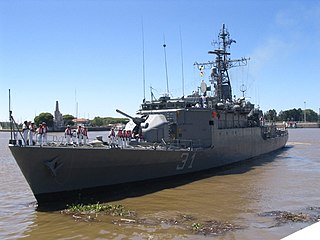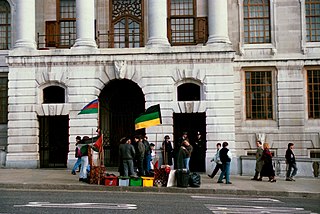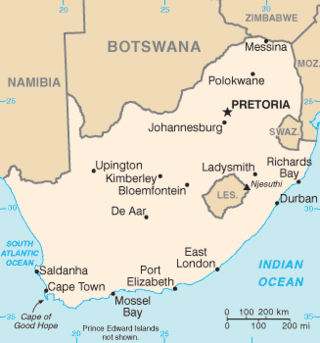
United Nations Security Council Resolution 134, adopted on April 1, 1960, was passed after a complaint by twenty-nine Member States regarding "the situation arising out of the large-scale killings of unarmed and peaceful demonstrators against racial discrimination and segregation in the Union of South Africa". The Council recognized that the situation was brought about by the policies of the government of the Union of South Africa and that if these policies continued they could endanger international peace and security.

United Nations Security Council Resolution 182, adopted on December 4, 1963, after the Republic of South Africa refused to co-operate with Resolution 181, the Council again requested South Africa comply with previous resolutions and that all States comply with resolution 181. The Council then requested the Secretary-General establish a small group of experts to examine ways of resolving the situation in South Africa and that he report back to the Council no later than June 1, 1964.

United Nations Security Council Resolution 282, adopted on July 23, 1970, concerned by violations of the arms embargo passed against South Africa in Resolution 181, the Council reiterated its total opposition to the policies of apartheid and reaffirmed its previous resolutions on the topic. The Council called upon states to strengthen the arms embargo by ceasing the provision of military training to members of the South African armed forces and by taking appropriate action to give effective to the resolution's measures.

United Nations Security Council Resolution 418, adopted unanimously on 4 November 1977, imposed a mandatory arms embargo against South Africa. This resolution differed from the earlier Resolution 282, which was only voluntary. The embargo was subsequently tightened and extended by Resolution 591.

United Nations Security Council Resolution 311, adopted on February 4, 1972, after reaffirming previous resolutions on the topic and noting the continued military build-up by South Africa, the Council condemned the policy of apartheid and recognized the legitimacy of the struggle of the oppressed people of South Africa.

United Nations Security Council resolution 591, adopted unanimously on 28 November 1986, after recalling resolutions 418 (1977), 421 (1977), 473 (1980) and 558 (1984), the Council strengthened the mandatory arms embargo against apartheid South Africa imposed by Resolution 418, and made it more comprehensive. Resolution 591 sought to clarify vague terms from previous resolutions on the topic.

In United Nations Security Council Resolution 417, adopted on October 31, 1977, after reaffirming Resolution 392 (1976), the Council condemned the continuing repression against black people and other opponents of apartheid, as well as the South African media and the mounting deaths of detainees. The Council foresaw that the continuation of such activities would lead to serious racial conflict with international repercussions.

United Nations Security Council Resolution 421, adopted unanimously on December 9, 1977, after recalling Resolution 418, the Council decided to establish a committee to oversee the implementation of that resolution. It tasked the committee to report back on its observations and recommendations regarding ways in which the arms embargo could be made more effective against South Africa and to ask Member States as to how they are implementing the resolution.

United Nations Security Council resolution 473, adopted unanimously on 13 June 1980, after recalling resolutions 392 (1976), 417 (1977), 418 (1977), 454 (1979) and 466 (1980) and letters from the Committee for South Africa, the council expressed its concern and condemned South Africa for the killing of protesters, including schoolchildren, opposed to apartheid.

United Nations Security Council resolution 503, adopted unanimously on 9 April 1982, after reaffirming Resolution 473 (1980), the Council expressed its concern at the death sentences issued by the Transvaal Provincial Division of the Supreme Court of South Africa against Ncimbithi Johnson Lubisi, Petrus Tsepo Mashigo and Naphtali Manana, all of whom were members of the African National Congress.
United Nations Security Council resolution 533, adopted unanimously on 7 June 1983, after reaffirming Resolution 525 (1982), the Council expressed its concern at the death sentences issued to Thelle Simon Mogoerane, Jerry Semano Mosololi and Marcus Thabo Motaung, all members of the African National Congress.

United Nations Security Council resolution 546, adopted on 6 January 1984, after hearing representations from the People's Republic of Angola, the council recalled resolutions 387 (1976), 428 (1978), 447 (1979), 454 (1979), 475 (1980) and 545 (1983), and expressed its concern at the continuing attacks on the country by South Africa through occupied South West Africa.

United Nations Security Council resolution 558, adopted unanimously on 13 December 1984, after recalling resolutions 418 (1977) and 421 (1977) which imposed a compulsory arms embargo on South Africa and established a committee to monitor it, the council stressed the continuing need for all Member States and international organisations to observe the arms embargo.

United Nations Security Council resolution 560, adopted unanimously on 12 March 1985, after recalling resolutions 473 (1980), 554 (1984) and 556 (1984), the council condemned the continuing repression of anti-apartheid activities in South Africa, noting that the repression would undermine the possibility of a peaceful solution.

United Nations Security Council resolution 566, adopted on 19 June 1985, after recalling resolutions 269 (1969), 276 (1970), 301 (1971), 385 (1976), 431 (1978), 432 (1978), 435 (1978), 439 (1978), 532 (1983) and 539 (1983), the Council expressed concern at the tension and instability caused the continued occupation of Namibia by South Africa, noting the apartheid policies implemented in the territory and that the territory was used as a springboard for attacks on other southern African countries.

United Nations Security Council resolution 568, adopted on 26 July 1985, after expressing its outrage and concern at the suffering caused by the apartheid system in South Africa, the Council further condemned the repressive policies of the apartheid system including murders and forced removals, as well as the state of emergency imposed in 36 districts in the country, demanding it be lifted immediately.

United Nations Security Council resolution 623, adopted on 23 November 1988, the Council noted with grave concern the death sentence imposed upon anti-apartheid activist Paul Tefo Setlaba, on the basis of "common purpose" in South Africa. The resolution at the meeting urgently called by Zambia strongly urged the Government of South Africa to commute Setlaba's sentence and stay his execution in order to further avoid aggravating the situation in South Africa.

United Nations Security Council resolution 765, adopted on 16 July 1992, after recalling resolutions 392 (1976), 473 (1980), 554 (1984) and 556 (1984), the council condemned the escalating violence in South Africa, in particular the Boipatong massacre on 17 June 1992, which resulted in the deaths of 46 people, and the suspension by the African National Congress (ANC) of bilateral talks with the South African government.

United Nations Security Council resolution 919, adopted unanimously on 25 May 1994, after recalling all resolutions on South Africa, in particular resolutions 282 (1970), 418 (1977), 421 (1977), 558 (1984) and 591 (1986), the Council welcomed the recent general elections and new government and decided, under Chapter VII of the United Nations Charter, to terminate the arms embargo and all other restrictions against South Africa.

As a response to South Africa's apartheid policies, the international community adopted economic sanctions as a form of condemnation and pressure. Jamaica led the movement by being the first country to ban goods from apartheid South Africa in 1959.












